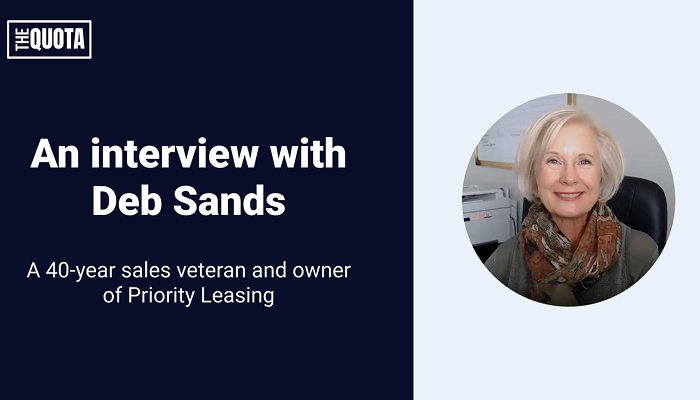
If you’re active on LinkedIn, then you’ve probably seen Ian Koniak’s posts before. Ian is a sales coach who was, at one point, the #1 AE at Salesforce. Along with his unabashed honesty, this is why we like Ian so much — he’s already done what he’s teaching others to do. This is why we’re announcing that Ian is The Quota’s preferred sales coaching partner. We wanted to work with somebody we believe in, and Ian is that guy. In the interview below, you can learn more about Ian and why we’ve chosen to work with him.
At Salesforce, you earned the distinction of becoming the #1 Enterprise AE and you’ve sold over $100M in your career. What inspired you to make the jump into starting a sales coaching business? Tell us about the “moment” (if there was one) where you decided to go for it.
I had a near death experience getting stuck upside down on a rollercoaster. I thought I was going to die. It was really a wake up call for me.
I thought that if I had died, I would die with all this knowledge that could really help people. I felt that I had a way to help people but I had been selfish in not sharing it. That day, I made a transition plan for myself and two years later I was running my own business. I started doing a few speaking engagements, and eventually people started reaching out to me and asking if I could help them directly.
They were looking for someone to hold them accountable and to teach them. That’s when I decided to make the jump into the coaching business. Never in a million years did I think that I would actually be making more money with my own coaching business than I would when I was at Salesforce. But I’ve been able to get the best of both worlds: I’ve been able to make my job into something that’s more fulfilling and is more lucrative than corporate sales.
What’s the most important thing salespeople should consider when deciding on hiring a sales coach?
First and foremost, has the person done the job that you want to do at the highest level? Credibility through actual performance is important. You wouldn’t hire a fitness personal trainer that is obese. You want to make sure that they’ve executed at the level that you want to get to. If you’re selling software and want to make $1M a year, find a coach who has made $1M a year selling software.
Second, look at client success. What are the clients saying? Look at testimonials. Talk to a few of them to get an understanding of how it helped them and if it would be a good fit for you.
Third, look at the domain expertise. When I was in addiction recovery, I had a therapist and a sponsor who specialized in the specific problem I was going through. When I wanted to start my own business, I hired Brand Builders Group who helps domain experts start their own business. Find the right coach with the domain expertise in the specific thing you need help with.
Get honest with yourself, identify which areas you need help with, and find the right coach with the domain expertise to help you.
Your coaching focuses a lot on building habits and the right mindset. What have you found are the habits that make a salesperson successful?
For mindset, it’s constantly having clarity about what you want. Top performers are always setting goals, and resetting their goals to stay extremely motivated. Once you lose that fire in your belly, everything falls apart. You need to be intentional about what you want to accomplish.
Top-performers have a humble mindset. Once you think you know everything and have all the answers, your results will go down. Top-performers are always open to learning and have a form of mentorship or help along that way that help guide them — and to do this, you need to have the mindset of humility and of always learning and growing.
The habit of time management and valuing your time is the most important for top performers. Saying no to low value activity and saying yes to high value revenue generating activities (RGAs). The best salespeople know where to spend their time and spend it on the activities most likely to have the highest impact on their bottom line. Focus on the best customer opportunities and say no to unqualified prospects that waste your time.
It’s one thing to put in maximum effort for a few days or a few weeks at a time. But most reps struggle with consistency. What can sales reps do to ensure they’re performing consistently rather than just working in spurts?
It’s something I used to do myself a bit. I would work really hard at the end of the month when I needed to hit quota, and then take my foot off the gas a bit when there was less pressure.
Consistency is important. A lot of people usually feel guilty when they aren’t consistent. Not because of the results they get, but because of their actual effort. When we’re not trying our best, we feel guilty, we feel like we wasted the day. If we say we’re going to do something and we don’t do it, we feel like an imposter.
Check yourself, see how you feel at the end of the day. Did you set goals and execute against them? If you did, you’ll feel good. If you don't, you'll probably feel bad about yourself.
Set the goals, and put in the EFFORT every day. You’ll feel better about yourself. Work a full day on the right things, manage your time, and be consistent. Success is the peace of mind that comes from knowing we did our best to become the best we are capable of becoming.
If you’re not consistent, you won’t have peace of mind. Show up every day and be consistent, you’ll feel better about yourself and the results will follow.
Why should a salesperson spend their hard earned money on a sales coach? How can you guarantee an ROI?
For any salesperson, the first time you invest in yourself can be difficult because you don’t know that it’s going to work. I tried to go at it alone in my career, and what I had been doing was not working. Fundamentally, it comes down to this: if you don’t have specific training or a manager at your company to coach and develop you, you’ll struggle to grow. It’s easy to consume content on LinkedIn and read books, but it’s extremely difficult to have the self-discipline and accountability to apply that day in and day out.
When you invest in yourself, you have skin in the game. The coaching itself isn’t a guarantee of ROI, it’s more of that mental state you’re in, when you make that decision and that commitment that helps you become better. When you have that mindset of being humble and seeking out help, and saying, “I’m going to invest in myself”, that decision puts you in the state of being committed to your growth and success. The act of purchasing coaching itself elevates the intensity of your commitment. As far as guarantees and ROI goes — there’s actually no guarantee of ROI.
Why? Because if you don’t show up and don’t apply it, and if you don’t take it seriously, it won’t work. What I’ve found is if you show up and do the work, take it seriously, you’ll see a massive return. All of my clients that show up and put in the work, end up seeing the ROI at the end of the year when they look back and compare their earnings during the year of coaching compared to the previous year without coaching. The ROI is clear. Half of them even sign up for a second year to continue the coaching because it’s helping them that much. My testimonial page lets people see for themselves. I've coached 200 people and most of them have given written testimonials. I’ve helped clients close million dollar deals, $10M deals, and even $25M deals with the help of our coaching program.
Give us a freebie, what’s one simple, actionable thing that every salesperson can do to increase their win rates?
First, you should understand what your actual win rate is. A lot of people don’t actually know what their win rate is. People define win rate differently. Win rate isn’t moving through stages of the pipeline. It’s proposals that are signed or lost. Tracking proposals sent and whether or not they are won or lost is important — a lot of salespeople aren’t clearly measuring this.
The one tip to increase win rate, is make sure you are only sending proposals to QUALIFIED prospects. By this, I mean, make sure you are solving a problem that directly affects their business. Something that the company can’t go another year without. If it's a nice to have, or they can live without it, it will be harder to close your deal. Listen to your prospects and uncover the problem that they need to solve or else their business will be negatively impacted in a major way. This may require digging deep and going beyond what they say is a pain point, to peel back the layers and get to the root of the real problem that they need to solve NOW. This is how you get senior leadership and the people who have final say over signing the proposal and spending the money on board. Uncover the pain point that needs to be solved, if you’re solving small problems that aren’t critical to their business, it’s much harder to increase your win rate.
Qualify early, and attach your solution to pain points and problems that need to be solved immediately or else there will be negative consequences for the prospect’s business at the executive level.
Finally, invest in yourself to get better. To help you get started, I put together a free training: How to make 500K-1M/year in tech sales.







